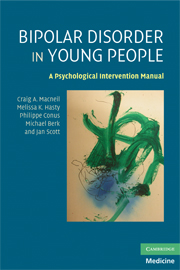Book contents
- Frontmatter
- Contents
- Preface
- Acknowledgements
- Introduction
- 1 Bipolar disorder
- 2 Assessment and engagement
- 3 Insight, adaptation, and functional recovery
- 4 Medication adherence
- 5 Cognitive behavioral therapy interventions
- 6 Social rhythm regulation
- 7 Relationship issues and family work
- 8 Alcohol, substance abuse, and other comorbid disorders
- 9 Identifying early warning signs, preventing relapse, and termination of therapy
- Appendices
- References
- Index
3 - Insight, adaptation, and functional recovery
Published online by Cambridge University Press: 06 July 2010
- Frontmatter
- Contents
- Preface
- Acknowledgements
- Introduction
- 1 Bipolar disorder
- 2 Assessment and engagement
- 3 Insight, adaptation, and functional recovery
- 4 Medication adherence
- 5 Cognitive behavioral therapy interventions
- 6 Social rhythm regulation
- 7 Relationship issues and family work
- 8 Alcohol, substance abuse, and other comorbid disorders
- 9 Identifying early warning signs, preventing relapse, and termination of therapy
- Appendices
- References
- Index
Summary
That proves you mad because you know it not.
Thomas Decker (Torrey & Knable, 2002, p. 41)In this chapter we discuss the issue of insight and ways in which young people may adapt to a diagnosis of bipolar disorder. While some young people minimize or deny their diagnosis, for others, bipolar disorder can significantly impact on their sense of self and identity, and can result in feelings of guilt, shame, loss, and trauma.
After consideration of these issues, we present strategies to help decrease distress, promote adaptive coping, and minimize the impact of the disorder on the person's view of self and their functioning. As with other chapters of this book, the strategies presented in this section are not intended to be delivered in a sequential fashion or as a discrete module. Instead, we encourage clinicians to continue to employ and revisit them where relevant throughout the intervention, recognizing that the young person's insight and needs can change across their phases of recovery and relapse.
Insight
Lack of insight has been described as a common characteristic of bipolar disorder (Pallanti et al., 1999), with some research showing that the degree of insight in bipolar disorder is similar to that of people with schizophrenia (Amador et al., 1994; Pini et al., 2001). Insight has been found to be consistently poorer for people with mania than for people with mixed episodes or unipolar depression (Dell'Osso et al., 2002).
- Type
- Chapter
- Information
- Bipolar Disorder in Young PeopleA Psychological Intervention Manual, pp. 36 - 54Publisher: Cambridge University PressPrint publication year: 2009



